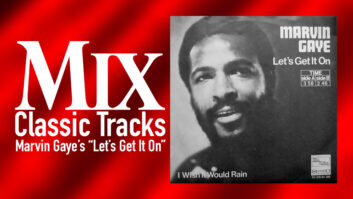No one speaks English, and everything’s broken…- Tom Waits, “Tom Traubert’s Blues (Four Sheets to the Wind in Copenhagen)”
There is not a more self-centered country on earth than the U.S.A. Thanks to the relentless blindering of our media and entertainment industries, our perception of foreign lands is predominantly of places with wars, floods and earthquakes, where people talk funny and eat strange things despite the fact that what they really want is McDonald’s and Coca-Cola.
As a result of this, Americans have an odd-and, I used to think, unique-way of dealing with people who don’t speak English. Since we can’t conceive of a world where not everyone speaks our language, when we are confronted with someone who doesn’t understand a thing we are saying, we simply repeat it, only louder. Of course, this doesn’t work, and so everyone goes away from the meeting feeling that the other guy is stupid. It doesn’t lend itself to a great deal of cross-cultural understanding, and it’s one of the many reasons why Americans have a reputation the world over for being boorish.
I liked to think that I was above that. My mother arrived here from Russia at the age of 12, speaking not a word of English. My grandmother, who came with her, had lost much of her hearing before she left Russia, and so she never really learned English. I grew up thinking that Russian was a language that was always spoken at high SPLs, since that’s how my mother and grandmother communicated with each other. But I also learned that when I am talking to someone who is not fluent in English, I need to speak slowly and clearly, and if they don’t understand me, I should find other words that perhaps will be more familiar to them.
Nonetheless, a few years ago, I found myself characterized as an ugly American thanks to an offhand comment I made in an online discussion group. A large Japanese company posted to the group a press release that was, to put it politely, a little awkwardly phrased. I expressed that I considered it dumb, if not arrogant, for a company with such formidable resources to post an important press release without at least having it checked over by someone who spoke English well, just to make sure that English-speaking readers would be able to make head or tail of it.
The group’s reaction was fast and furious, mostly along the lines of “Lehrman, you ignorant/xenophobic/chauvinistic/racist/jingoistic slut/pig/ Yank/(unprintable noun)! How dare you expect the rest of the world to speak your language! Don’t you know there are billions of people who don’t speak English? How would you feel if they criticized you every time you tried to write something in their language?”
The response was vehement enough (and from people whom I respected enough) that I uncharacteristically held my tongue and didn’t pursue the matter. But this past summer I did something else equally uncharacteristic, and it brought that incident back to mind.
I am not much of a world traveler-my brief adventures in Trinidad are now a matter of public record, and I have gone on short jaunts to Europe a couple of times on business-but this summer I let my wife talk me into spending a whole month in France, on vacation. She had been wanting to do this for years, and I had run out of excuses, so through an agency we found a French couple who wanted to spend a month in New England, and we exchanged houses with them. Theirs was a lovely, modern house in Perpignan, a small city on the Mediterranean, very close to the border with Spain. We also exchanged cars, and so it worked out to be a relatively inexpensive way to have a fairly exotic vacation.
Now, we had been to France before. I had taken my wife to a computer-music conference in Paris when we first met, and a few years before that, she had done a tour of France and Italy. We didn’t recall any major problems communicating with the locals, but this time, just to make sure we’d be okay, we hired a private tutor to help us brush up our high-school French before we got on the plane. He tried to warn us that we were about to enter la France profonde-the real France, as opposed to the more international areas of Paris and the Riviera.
And profonde it was. We found that literally no one in Perpignan or the surrounding area spoke English. We had been warned that, among Western European countries, France has the least number of bilingual citizens, and it was most definitely true in this region. We found a handful of English speakers, but they were either tourists or expatriates: Belgians, Dutch, Danes and Germans, as well as English and Irish. But among the natives-the post-office workers, bank clerks, waiters, hotel clerks, even the government tourist office staff-hardly anyone spoke English at all.
Furthermore, the thought that someone would be in their midst and not be fluent in French didn’t matter to them. When I would approach someone with a carefully thought-out sentence, in what I hoped was well-pronounced French, the response was either “Comment?” (“Huh?”), thus making me feel like an idiot, or, if I was successful at constructing a coherent sentence and they actually understood what I said, I would be assaulted by a flood of idioms, contractions and regional accents that were way too fast for me. I would then reply, “Pardon?” and they would act just like Americans: They’d say it again, louder, making me feel like an idiot.
I realized what my mother must have felt when she arrived in America as a child. In fact, I felt more like a Martian who had just landed in Dubuque. The lessons of that online discussion came back to me hard: We were now the strangers in a strange land. In fact, in French, the word for foreigners is just that: “etrangers.” Here was a country that could be just as linguistically arrogant as the U.S., only this time we were the victims.
So I thought about those poor Japanese PR writers struggling to make themselves understood in a foreign tongue. Did I suddenly feel sorry for them? Did I now sympathize with people trying to do business in lands where the languages were different from their own? Did I achieve a new level of international tolerance and understanding?
Not on your life. What I realized was that if I ever wanted to do any serious business in France or any other country where they don’t speak English, I had damn well better know the language a whole lot better than I already did or else hire somebody who did. No way I would try to do it myself, with the tools in my possession. And it made me even more resentful of companies that try to enter foreign markets without making a proper effort to know the language, or the people, it is trying to sell to.
The audio industry is more international than it’s ever been. Our equipment comes from Germany, the Netherlands, Japan, Korea, England, Singapore and even Russia, to name a few. Our studios are doing work for clients and audiences who speak dozens of languages, to be distributed on CD or DVD, over cable, satellite or the Internet, to billions of people in hundreds of countries. If we make equipment, we’re trying to sell it not just to Americans but to facilities in Israel, the Arab world, South Africa, India and, potentially the biggest market of all, China.
The globalization of the banking system, along with the Internet and cheap phone rates, has made it easier than ever to do business overseas. But the communications revolution hasn’t had one particular effect that Americans seemed to expect-although English is more widespread than it’s been since the heyday of the British Empire, it hasn’t become the universal tongue. Language differences are surviving the age of the Internet and, in some ways, are thriving.
America itself, always a nation of immigrants, is perhaps today even more linguistically diverse than ever, as new waves of the economically or politically disadvantaged people arrive. In spite of California’s efforts to outlaw them, Spanish speakers are increasing in number. In some areas of New York, you can walk for miles and never hear English spoken. And it’s not just along the coasts-there are large enclaves of Haitians, Southeast Asians, Latinos and Eastern Europeans to be found all over the U.S.
On the other side of the Big Ditch, the European Union’s adoption of a single currency, the Euro-while it promises to make the arcane arithmetic of converting between francs, marks and pesetas a thing of the past-doesn’t mean that the language barriers are coming down. If anything, in the face of economic internationalism, cultural nationalism is being encouraged. In France, for example, regional dialects such as Catalan, Provencal and Breton are being taught in the schools again, as a way of maintaining or restoring a sense of cultural pride.
As more nations are joining the world economic and cultural community, awareness of language differences is more important, not less. And if we want to succeed in the international marketplace-whether we make or sell goods and run studios or work in them-we ignore these differences at our peril.
What is the solution? One word: empathy. Think of yourself as the etranger. Make the first step so that your customers and clients feel comfortable with you and don’t have to fight to make themselves understood. That means having people on staff who can speak the language of your clients or, if you are trying to run an overseas operation, having people on the ground who know the local culture and language well.
When manufacturers are not successful selling in other countries, it’s these cultural and language issues that are very often to blame. Some companies don’t trust their foreign reps and don’t let them make their own business decisions, or don’t give them the freedom and the budgets to let them create the support materials that will allow them to do their jobs. It’s hard to convince customers to take seriously a company that prints its press releases and product brochures in pidgin English, or French, or Japanese. User manuals that are not translated (or even better, written) by native speakers are a great source of frustration-and sometimes hilarity. On my wall, I have a copy of a page from a manual for an electronic keyboard made in Asia. In it, the user is instructed to attach the legs to the bottom in a highly unusual and creative, not to say somewhat painful, manner. Some poor writer in the home office was apparently searching for the English equivalent of the word “screw”-and the verb he came up with is still considered unprintable in many English-language publications, including this one.
Companies that are penetrating (sorry!) foreign markets have, besides good products, marketing organizations in place that understand the needs of local customers. And most often those organizations are headed up by people who are native speakers.
One fellow I spent some time with in France, Gerard, runs a medium-sized audio hardware and software manufacturing company and recently decided it was time to take on the American market in a big way. His English is good (that is, it’s a heck of a lot better than my French), but he knows that he could never handle the entire American operation with it. The way he sees it, his American office needs to be able to communicate with the customers first and the home office second. So he’s staffing it with Americans who know the local market and talk the talk and can learn the products. But he is also bringing his new American employees to France for several weeks at a time, not just to become familiar with the company, but to immerse themselves in the language so that they can communicate better with the home office. I applaud his sense of priorities, and I wish him well-and not just because of the absolutely amazing Catalan restaurant he took me to for lunch.
Studios that work extensively with non-English-speaking clients know the value of having someone on staff who can talk the client’s language. And if you are dealing with dialog or voice-overs in a language you don’t know, running the finished product by someone who does know it can save a lot of trouble down the road-like when you find that a little edit you did trying to snip a second from the track radically changed the meaning of a sentence.
When you’ve been on planes and other forms of transit for 14 hours, and you find yourself in a supermarket dying for something to eat, but it takes you 20 minutes and four intensely frustrating conversations to figure out where and how to get a shopping cart-which was how our first day in Perpignan began-you get a certain helpless feeling. And let me tell you, it’s something you don’t ever want your customers or clients to feel.
Despite the initial difficulties, we really did have a wonderful trip, with many magic moments. One of the best happened when Gerard’s 6-year-old daughter met my wife, who entertains children professionally. They bonded instantly-even though the girl didn’t speak a word of English. Their fascination with each other transcended the language barrier. After we came home, my wife was inspired to write a story for the girl, with her as the star, in the girl’s own language. But before she sends it to her, my wife is going to be sure to run it past someone who really speaks French.







